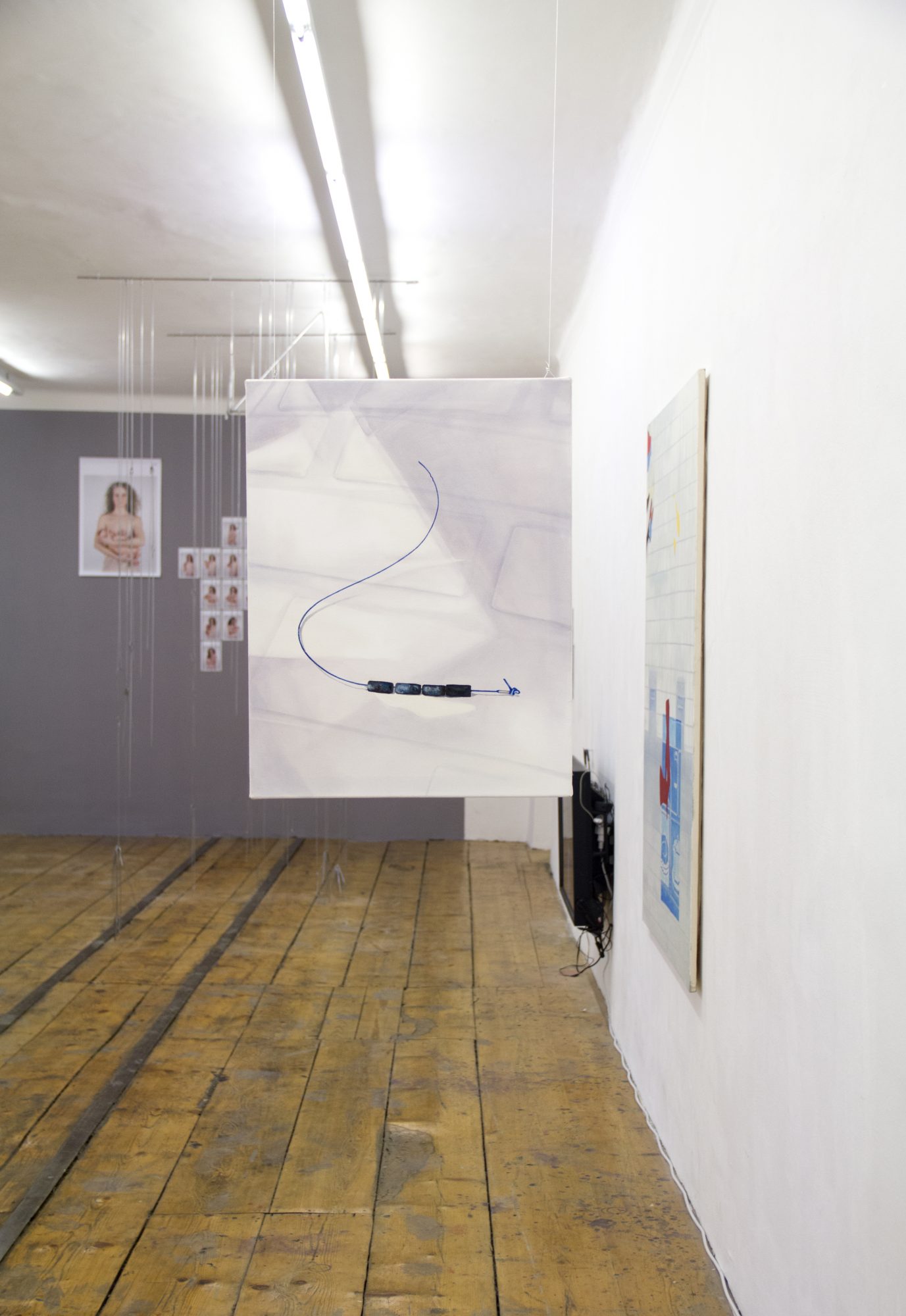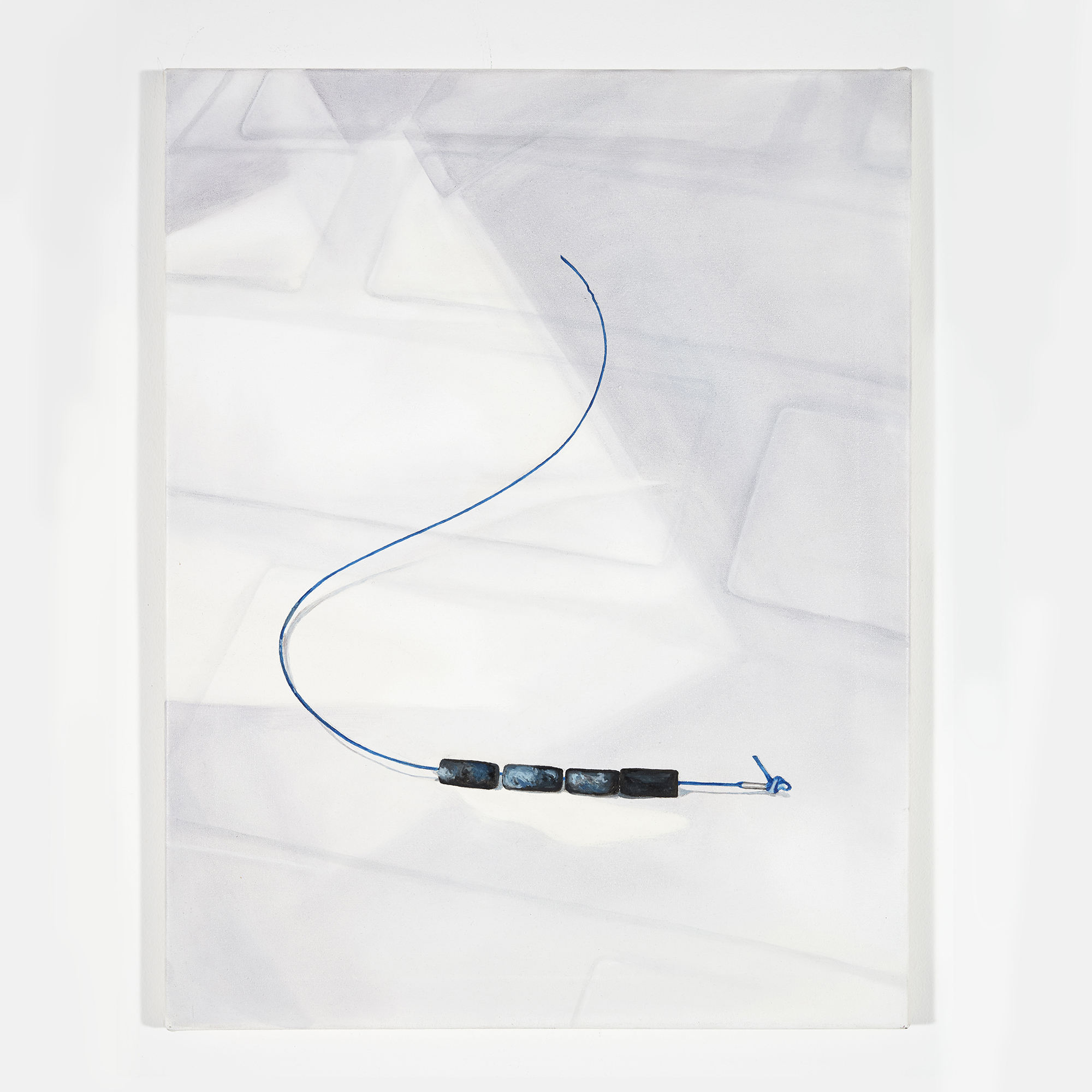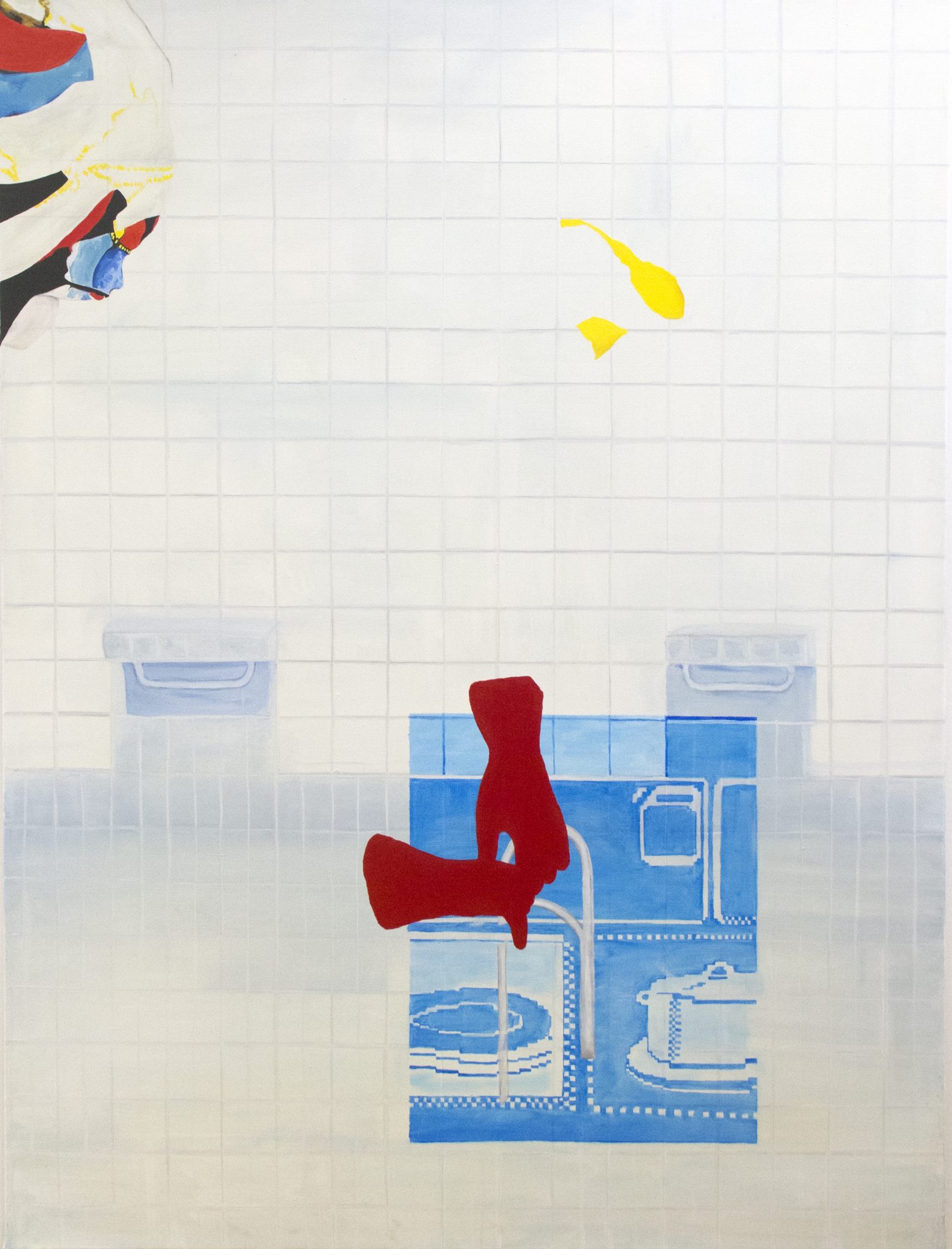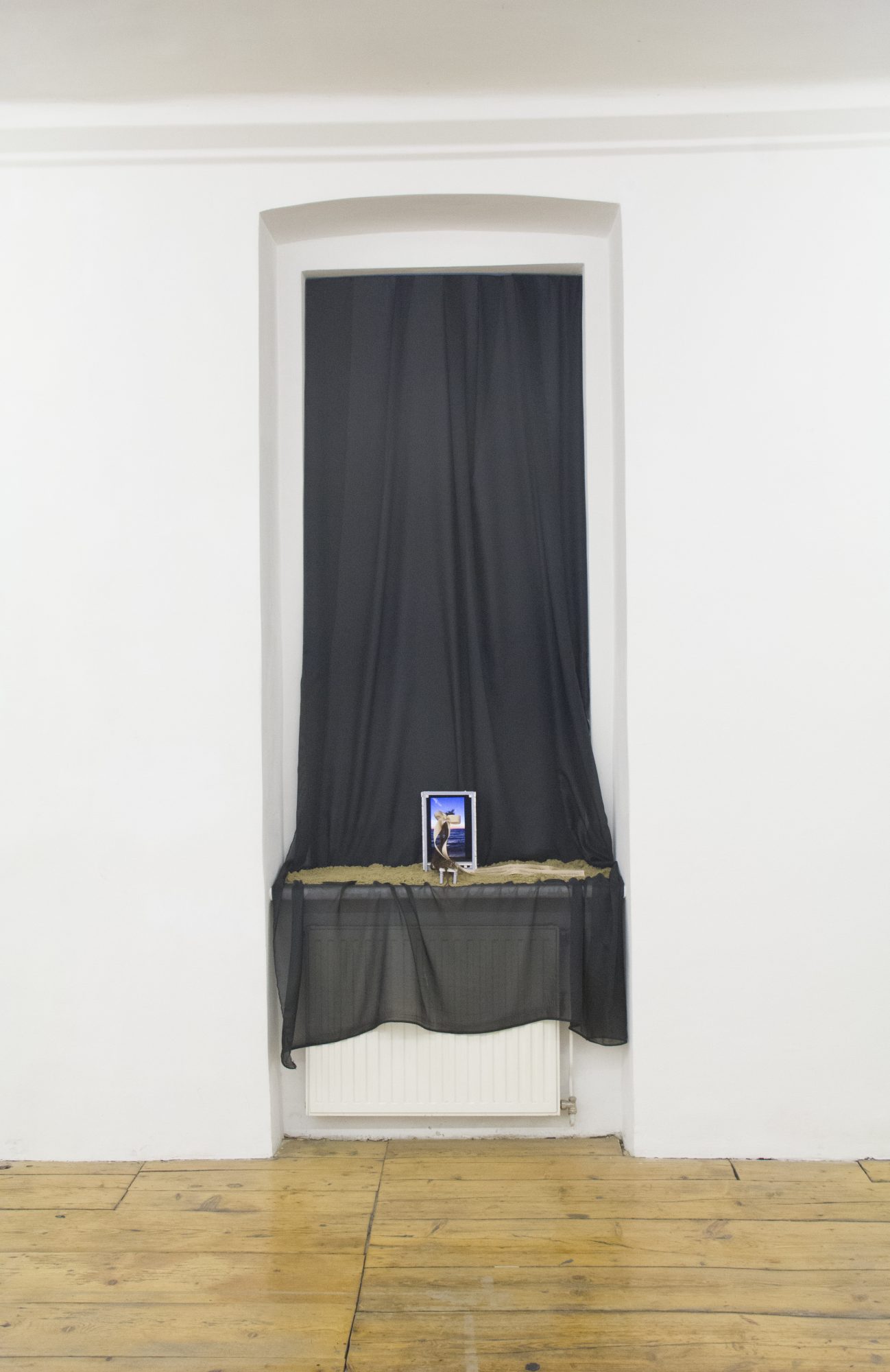Krinzinger Projekte, 2019
Curated by Anna Mikaela Ekstrand, Carlota Mir, Chiarina Chen, Katrina Longo, Lina Romanukha and Valeria Schiller.
presented by BLOCKFREI

Installation View, Is This Intimacy?, Krinzinger Projekte, Vienna
Text excerpts from the catalogue to the exhibition, Is this intimacy?, Krinzinger Projekte, 2019
The topic of intimacy carries ties to multiple interconnected subjects where sexuality and coupledom are an obvious and broad subject of focus: bodies, pleasure, lust, pornography, voyeurism, and technologies of control are all pregnant themes. Veronika Abigail Beringer’s portrait of her Intrauterine Device (IUD) Weaving and contaminating your sterile connections (2019) objectifies the commonly used but rarely seen contraceptive device. An IUD can signify a person’s physical preparedness to sex and an act of self-protection to enjoy sex and avoid pregnancy. While lodged in the cervix, the IUD object is concealed, hidden from the public and its wearer: its position within the body is not meant to be seen or felt, it is relatively invisible. The IUD becomes a functioning part of the body, a prosthesis, an organ. As queer philosopher Paul B Preciado states in his groundbreaking work Testo Junkie, it is one of those “soft, feather-weight, viscous, gelatinous technologies that can be injected, inhaled “incorporated.” A postwar contraceptive device that came along with the pill, the medicalization of transexuality, and the widespread use of plastic surgery to enhance physical features and sex appeal, the IUD is a “pharmacopornographic” device that signals the primacy of sex as a subject of political management under late capitalism. Nested in the heterosexual, female body, its quiet presence encapsulates the contradictions of contemporary, sexed subjectivity, at once liberated from the tyranny of imposed, serial motherhood and subject to biopolitical control.
Beringer’s attachment to her IUD was made corporeal and physically explicit only at the time of its removal. Upon seeing it for the first time she made the request to keep it, both mortalizing and immortalizing the intimate object, which now is kept preserved in formaldehyde. The painting displayed in physical relationship to the preserved object invites the viewer to ponder alienation, affection and care as the entities mediate between realities. Emerging from this tension, its presence within the uterus represents an uncanny form of intimacy, most accurately depicted by Jean-Luc Nancy in Corpus: “The only veritable intimacy of the body is in silence… But when I sense my stomach or my heart, or my lung, I sense it, and if I sense it, it’s from the outside.”

weaving and contaminating your sterile connections, 2019, oil on canvas, 72 x 56 cm
With the proliferation of online dating platforms, and the insipid way in which they fit comfortably into our lives, artists are exploring this topic, and in turn, finding sources of inspiration and contestation within. Online dating presents a forum for our posthuman selves to shine. We manipulate and modify our representations, filter our photos, take computergenerated ‘conversation starter’ prompts, and swiftly ‘unmatch’ if immediate connections are not generated. Leaning on something unstable and realizing that you are actually floating by Veronika Abigail Beringer vocalizes the tensions evident in finding intimacy in contemporary contexts, and also the strength in realizing liberation from structures, and support by ethereal forces manifested by the self. In our global world of possibilities, complete with pleasures and perils, we throw heart-shaped emojis at this illusion of choice, and often end up lamenting at the hollowness. Beringer’s Clingy without commitment playfully investigates the layers of this notion, presenting two hooks lying in a bathroom floor which, despite being designed to interlock, cannot seem to connect. Instead, they seem fated to butt heads, confused, colourful, and stagnant.
clingy without commitment, 2019, oil on canvas, 56 x 48 cm
tiffi escaped didn’t, come far though, 2019, oil on canvas, 72 x 56 cm
Beringer’s recently completed piece Tiffi Escaped, Didn’t Come Far Though illustrates how intimate connections create narratives – here between the artist, a lover, and Tiffi the turtle. Beringer’s lived experience collages this work, with some layers of meaning evident upon inspection, others hidden, and all open to individualized interpretation. Layered with intricate shifts in tone and form, the piece communicates complexity: a figure burrows downwards but their hands reach upwards in vertigo, Tiffi swims beneath. The standard sheet is torn in parts, exposing landscaped bodies, and mending a moment of anguish with gold-laced paint. In this work of revealing and concealing, we see fusing languages with positive undertones: intimacy is possible.


Installation View, Is This Intimacy?, Krinzinger Projekte, Vienna
leaning on something unstable and realzing you’re actually floating, 2018, oil on canvas, 160 x 120 cm


I <3 everything abt u, 2018, hair, wood, sand, ribbon and iPad with video
Veronika Abigail Beringer’s piece I <3 everything abt u (2018) explores the notion of fandom as an ambiguous, contemporary form of intimacy. Upon stumbling on Tumblr link fuckyeahvictorialegrandshair.tumblr.com, which was created by an anonymous fan in devotion to Beach House’s lead singer, Victoria Legrand, Beringer became fascinated by the concept of fandom and this specific fan’s interest in the singer’s hair. A series of photos published on the blog captured Legrand mid-performance, a defining image featured her curls mid-air thrashing as she performs. The blog also features a fan poem imitating the style of a love letter or song lyrics:
5th February 2011
∞ I’m getting lost in Vicki LeGrand’s
curls…
Oh Vicki…
I’m getting lost in ur curls…
Kinda like the hit AnCo song
“Bluish”
except more meaningful… bc it is abt u
I <3 everything abt u
the way ur mop falls in ur face
the sound of ur voice
the definition that your shoulder pads
within ur blazer offer ur frame
In response to her findings, Beringer created a mixed media installation, a shrine of sorts comprised of wood, hair, ribbon, volcanic sand, and an iPad. Expanding into the medium of installation, Beringer experiments with tactility in this piece, composing the materials in a similar style to her painted works to form a layered and evocative assemblage. Categorized as indie rock or dream pop music genres, Beach House are most recognized for their ethereal vocals and immersive sounds that hold listeners within onflowing beats. In his review of the band’s seventh album in Pitchfork Jayson Greene alludes to the bands beckoning call for intimacy from their listeners:
“Over six albums, Victoria Legrand and Alex Scally of Beach House have offered the same enticement: ‘There’s a place I want to take you; help me to name it.’ The implicit promise has always been that if you opened up entirely, gave enough of yourself, the nameless sensation they evoke would finally come into focus, and the shapes moving beneath the surface of their music would resolve. You would finally understand if you came closer, stayed longer, looked deeper.”
Fandom is traditionally understood as a gendered form of intimacy that is onesided, often unfulfilled, over-emotional, and unrequited. Recently, however, feminized over-identification has been readdressed in feminist terms by authors such as Catherine Grant, as a valid form of self-assertion against the mechanisms of globalized, digital capitalism. The celebrity crushes we once had pasted on our bedroom walls and the books we stacked on our living room shelves are now posted on our Facebook walls, or perhaps they’ve morphed into Twitter follows and Instagram reposts, liberating our adorations, politicising our alliances, and transcending our private desires, aspirations and fantasies into the public sphere. On the other hand, the immediacy and far reach of social media, and viral sharing means that it is entirely possible that interactions and dialogues between stars and fans, and staged images of virtual reciprocity based on one-sided desires may lay a skewed foundation for relations where intimacy remains a performed fantasy.